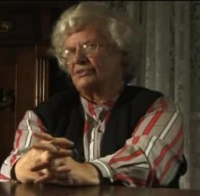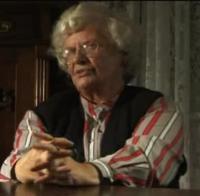"Locals and all those who came here on our land - a lot from Warsaw but also repatriates from the former Polish territories beyond the river Bug came in numbers, we all attended one church, the Catholic Church. Service was in Latin, so we all responded in Latin, and we were equal in a church. The cermony was in Polish but we understood enough. In fact the priest, our respectable priest Czeczka spoke probably a little local dialect. But really, there was no trouble in understanding. Some of us didn’t know the Polis dialect, maybe did not understand, but we all answers in Latin, and it brought us together. This is who we were: outcast people – those people who left their homeland, their country, their belongings and settled here with us, and we – very poor people, we had nothing, only lands, sometimes homes if they were not burned.
Nobody had any machine or even a horse, just nothing. And we prayed together in the church. And it my opinion, the church brought us together. If I mentioned a church I need to add a few words about the Protestant church in Olsztyn. When I moved to Olsztyn in 1956, I used to attend the cathedral - to the Catholic Church, just because it was our parish. Everyone went there, Catholics, those who had been here before, and those who came – protestants. But no Catholics attended to the Protestant church. Only the people who were born here, and who grew up as Protestants. There were also no protestants in central Poland, maybe just a few. The refugees from Elk or from Mazury who stayed here in Olsztyn, who could not escape, and who simply decided to live in Olsztyn – they were protestants. There are a lot of people from Elk who were stayed here until now. Many of them wanted to go back to their houses, but there were no houses anymore, someone else has already settled in their homes and took their farms so they stopped in Olsztyn. This evangelical church belong unwritten to the German minority. Maybe not even a minority, there were many of us here that time. And we
were Germans and we were Protestants. I always attended a Mass at 10 in the Cathedral when I lived in Olsztyn. When the Mass was over I used to go to the Protestant church. The service there ended in the same time so I went to meet my friends who were Protestants. I think the Church had very important role that time. We united with those who were driven out from the east. But the Protestant church was also a kind of Protestatnt German enclave. And there was such a division. But what did the House of God mean in this time? The House of God could be Protestant but it is still the same God. Germans who were born here went to the Lutheran church. We were united with people who come here from the former Polish territories beyond the river Bug. And they always asked - when the Germans will be back here? When will the Germans come back? We want to go, we want go back to our land, beyond the river Bug. To Vilnius, we want to be in Vilnius again. They always repeated: We want to go Vilnius. This is how the life went on".


